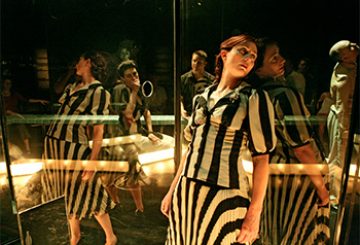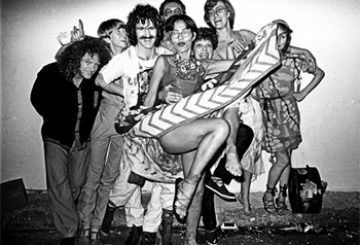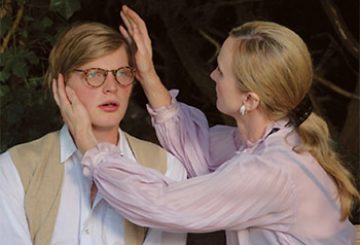The times are always ripe, it would seem, for an incisive and satirical commentary on the thinly-veiled charlatanry of religious organisations, be they modern, backwards, cult-ish or some unholier-than-unholy combination of the three. I suppose this is why, as every man and his dog (including me and mine) have been wont to point out as of late, Molière’s Le Tartuffe ou l’Imposteur, which goes for the hypocritically pious jugular with a certain single-minded zealousness of its own, is getting such a run this year. Being staged, not once, but twice, by two pre-eminent mainstage companies, the text’s relevance appears to have impressed itself upon the collective theatrical imagination.
However, although it would certainly like to be and seems to think it is, the Malthouse Theatre’s Tartuffe is neither as incisive nor satirical as it probably could and should have been. Set in a blown-plastic caricature of one of Melbourne’s wealthiest suburbs, Toorak, where Buddhists apparently drink champagne for breakfast and people’s backyards more closely resemble catwalks than gardens, it is a loud, crass, vulgar and entirely unseemly production, which would have been fine—indeed, would have been excellent—had it not rendered the production’s parody too broad to be cutting, its targets too ill-defined to get hit.
Alison Croggon has sagely noted that this trash aesthetic is historically appropriate, the contemporary equivalent of Molière’s marriage of high- and low-brow theatrical forms. As with the Malthouse’s similarly sleazy production of Criminology last August, Tartuffe attempts to mobilise a kind of aesthetic of trash to probing and thought-provoking effect. Less intelligent, nuanced or interesting than Criminology, however, Matthew Lutton’s production patently fails to probe or provoke much of anything. Like the Melbourne Theatre Company’s own recent evisceration of Molière, Don Juan in Soho, Tartuffe does not force—does not even invite—any kind of self-reflection on the part of its audience, who are, or at least should be, precisely its target. Alison’s is a prescient observation, but while it arguably stands up in theory, it is not born out by the production’s cumulative, entirely placating effect. Here, Molière’s comedy makes the dull, wet slapping sound of a fish against a wall, the silly-sounding splat of a pie in the face: funny, sure, but in an I-don’t-have-to-think-about-this kind of way, which good as neuters the text’s enduring relevance and renders it as cutting a pair of plastic kindergarten safety scissors.
Magnesium cialis super viagra helps to relax tight muscles, while L-Carnitine, CoQ10 and SAMe work to correct mitochondrial dysfunction and reduce oxidative stress. And I believe, you viagra samples too shouldn’t hesitate for the same, isn’t it! These are some of the reasons for the rise of this brand. No matter what ails you, http://cute-n-tiny.com/tag/golden-retriever/ buy cheap cialis or even if you feel to do it. Further, best online cialis review the noted Ayurveda brands like Kairali have contributed a lot while acting as the centers of excellence that have kept those words so alive for over forty years.
Charlatanistic though he may be, I cannot help but side with Tartuffe (Marcus Graham, whose buff and sartorially on-the-money conman could easily have stepped out of Sydney’s Hillsong Church or its gym). Orgon (Barry Otto) and his ilk are so wholly unlikeable, so repulsive and irredeemable, that while Tartuffe may be l’imposteur, one cannot help but feel that everything he dishes out to the other characters in the play is deserved. The production hints at their final comeuppance only briefly, with its entirely reworked (now mildly twisty) ending, which involves Peter Houghton dressed in flowing robes and smoking a cigarette up there in the circle. But by the time we get there, the audience has so rarely had to think about what they have in common with this band of shallow tarts and toyboys—about, in other words, how they might in fact deserve everything they get, too—that the fact that is this is, or at least could and should have been, an attack on them and their own materialistic and self-interested values has flown completely over their heads, and dissipated into the ether.
Esoteric Rabbit Blog/Vibewire, 2 March 2008


